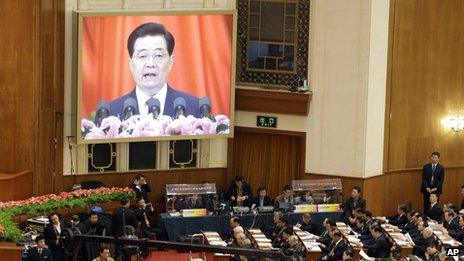Analysis: Hu Jintao's speech
- Published

Hu Jintao's speech to the party delegates contained few surprises
Headline political speeches in the West are often about springing a few policy surprises. Politicians need to grab the headlines and force their opponents onto the back seat.
But in China, the last thing that Party Secretary Hu Jintao would want to do in his final report to the 18th Party Congress being held in Beijing would be to startle anyone in the audience.
And in this, he did not let anyone down.
Asking about what might be new in a speech is in a sense missing the point. This is not a major presentation about specific policy initiatives. It functions as a review of the previous five years since the last Party Congress and then sets broad parameters for the coming five years.
It is almost a ritualistic event in which the Party faithful are reassured, they hear what they have already heard before, and everyone comes away with the feeling that the Party and its leadership are in control.
The targets presented are highly abstract. The strategic objectives spelt out in many, many other documents. This speech simply operates as a kind of canonical, authoritative statement.
'Double-edged gift'
To ensure this truly is a statement of consensus, Mr Hu's report would have been sent through numerous redraftings, reiterations and rewordings.
It would have gone through all the ministries, provinces and party organs throughout the vast land, and in this way be something which everyone could be happy listening to.
The one in 2007 was apparently rewritten over 50 times. No doubt this report received similar treatment.
The communiqué issued by the Plenum of the Central Committee at the beginning of November - the same meeting at which Bo Xilai was removed from his Party posts and sent to the civil courts to be dealt with - partially set the scene by referring to the very serious economic downturn suffered by the rest of the world after 2008.
In that sense, Mr Hu has been given a double-edged gift.
Economically, the collapse of Western export markets and finance systems after 2008 caused headaches in China. But politically, the Party can point to this and say that any failure to reach the targets they set themselves from 2007 was the fault of the unexpected outside environment, and not because of anything they did.
In fact, as we know, China posted decent growth even in the worst year, 2009 - and double digit growth right up to this year.
One of Mr Hu's main objectives in this report, therefore, is not to raise, but slightly lower expectations. The country, in the end, can't continue growing at this breakneck speed. Now things need to slow down.
'People as the key'
Mr Hu did give an impressive long list of potential reforms on the socio-political area in 2007, and these are revisited this year.
Once more, he stated that society must continue to aim to be "a moderately prosperous society" by 2020.
Once more he emphasized the key importance of his own ideological contribution to the Party - scientific development - but he did this in the standard context of also referring to Mao Zedong Thought, Deng Xiaoping Theory, and Jiang Zemin's "Three Represents". No radical ruptures there.
He stressed the need to continue "taking people as the key", and saying that a delivery of education, medical systems and old age care were the fundamental things that the Party expects government to deliver, on top of the absolute key priority of continue to raise living standards and deliver GDP growth.
But beyond the rhetoric of promising political reform this time, Mr Hu's most emphatic point was that there would be no Western-style democracy. The future leadership will not be introducing bold new reforms in this area at least, but sticking to the mantra of stability, gradual change and taking the economy as the key.
'Reassuring'
All the standard slogans we have become familiar with during the Hu Jintao period - and particularly in the last five years - got an airing in his speech. "Peaceful development", "creating a beautiful China", "firmly marching on the path of socialism with Chinese characteristics".
There was the familiar stress on needing to have stability and security in society, and to support the military, nurture good relations with Taiwan across the Strait and, perhaps with a little more force than it would have usually been given in view of the Bo Xilai events, a section on the need to do something about corruption.
All it really tells us is that, till the last, Hu Jintao has been a man of immense political and personal self-control. His legacy will be consensus-led, collective leadership in an age in which Chinese society was undergoing fast, profound and disorientating changes.
While he has consistently spoken in this eerily impersonal, ego-less register, the world around in China has changed massively.
There are more protests, more wealth, more division, more diversity - and perhaps more hope.
It would be interesting to wonder how many people within the Great Hall of the People listening to Mr Hu wondered whether he might at least have addressed some of these issues more directly and in a more personal way.
His successors almost certainly will have to.
A report like this to the inner core of the Party followers and the elite belongs to the sort of areas that need reform which Mr Hu indirectly alludes to.
The interesting issue is whether, with his going, the Party leaders that replace him can start taking arguments to the people in ways which he, to the end, very much resisted.